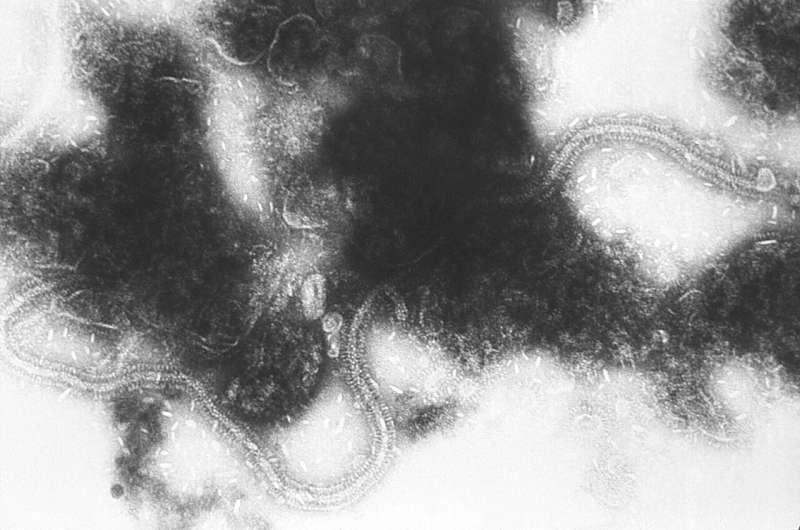Study predicts which kids hospitalized with RSV likely to worsen

Children hospitalized with breathing problems due to a common viral lung infection are likely to get sicker and remain hospitalized if they have high levels of defective copies of the virus, according to a new study by researchers at Washington University School of Medicine in St. Louis.
The findings, published April 1 in Nature Microbiology, could help doctors identify those patients at high risk of severe illness due to respiratory syncytial virus (RSV), the most common cause of pneumonia and bronchiolitis (inflammation of the small airways) in children under age 5.
"Every child has been infected by RSV at least once before the age of 3," said senior author Carolina B. López, Ph.D., a professor of molecular microbiology and a BJC Investigator. "Some infants and small children will just develop a cold, but others end up hospitalized. We don't really know what determines whether a child will get really sick or not. So when babies are admitted to the hospital with RSV, doctors don't have a way to predict whether they will be discharged in a day or two, or end up in intensive care."
The new findings could lead to a way for doctors to triage people who arrive in the emergency room wheezing from an RSV infection, and direct the most intensive interventions to those most at risk of getting even sicker, López added.
RSV is a common respiratory virus. People get reinfected many times over the course of their lives and usually only experience cold-like symptoms. For young children and older adults, however, RSV infection can be life-threatening. Every year in the U.S., about 58,000 children under age 5 are hospitalized due to RSV infection, and from 100 to 500 die. The virus also kills about 14,000 older adults every year.
López and colleagues previously discovered that RSV, as it multiplies, makes some nonfunctional copies of its genome. These defective viral genomes are missing crucial sections, so they can't form new infectious viruses, but they do trigger a strong antiviral immune response. To find out whether the presence of defective viral genomes affects how sick people get, López collaborated with co-corresponding author Christopher Chiu, MD, Ph.D., of Imperial College London, Shaon Sengupta, MBBS, from the Children's Hospital of Philadelphia, and co-first authors Sébastien A. Felt, Ph.D., now a postdoctoral researcher at Washington University, and Yan Sun, Ph.D., now an assistant professor at the University of Rochester Medical Center, among others.
The researchers analyzed viral RNA in nasal washes from 122 children under age 2 who had been hospitalized with RSV. Defective viral genomes were found in 100 (82%) of the children. Those with defective viral genomes got sicker and stayed in the hospital longer than those without.
Further studies with infants who had been naturally infected with RSV but not hospitalized, and with healthy young adults who had been experimentally infected, showed that the health consequences of the defective genomes depend on when they show up in the course of illness. Those children and adults who generate detectable levels of defective genomes early in the course of an infection had shorter and milder illnesses than those whose defective viral genomes were not detected until later or those who never developed defective genomes at all.
"The defective genomes are kind of a proxy for the immune response," López said. "No matter when in the course of infection we detect defective genomes, we see a stronger immune response. But timing matters here. A strong immune response very early after infection is good because it prevents the virus from multiplying. But if the immune response comes too late, when the virus has already multiplied, it is likely very damaging and leads to more severe illness."
It is possible that a similar pattern also may be found in other respiratory viruses, López said. The researchers used a common laboratory technique known as polymerase chain reaction, or PCR, to identify the defective viral genomes in infected people. Such a technique could be adapted to other respiratory viruses.
"More and more people have been looking for defective genomes in viral infections, and every virus they've studied has turned out to have them," López said. "We have more work to do to learn whether these defective genomes really are drivers of outcomes in different viral infections. But I do think it's worth putting the energy into trying to understand what these secondary products of viruses are doing to determine the course of the infection."
More information: Detection of respiratory syncytial virus defective genomes in nasal secretions is associated with distinct clinical outcomes, Nature Microbiology (2021). DOI: 10.1038/s41564-021-00882-3





















